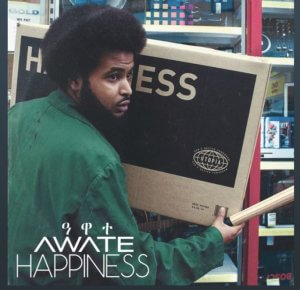
“I don’t like people telling me what to do” Awate raps on Wake Up Aneurin Bevan, the fifth track off his debut Happiness LP.
Of course, resistance is a theme Awate revisits many times in his music — his record label is even called Quite Defiant Records. His music is known for its surgical condemnations of poverty, racism and inequality and he’s also a prolific activist and writer, focusing mainly on the marginalisation of poor communities. It shouldn’t be too surprising that his debut LP largely concerns resistance, however Happiness, despite its title, possibly finds Awate at his angriest.
Awate originally arrived in the UK as a refugee from Eritrea via Saudi Arabia. Once in the UK, he settled in Camden. He released his first EP Shine Ancient in 2016, and has toured with Lowkey and supported Jay Electronica, Big Daddy Kane and Yasiin Bey (AKA Mos Def). He was also named one of the seven most inspiring people in London by the Evening Standard.
Happiness is a culmination of two years of work. The album was written when Awate was out on bail during that time, fighting four court cases against the police which he eventually won. Despite the stressful period, the sonic elements of Happiness don’t become gloomy too often. Opening track Jewels is a fun and bright upbeat track with big horns and wonderful vocal layering. Production of Happiness is handled by Turkish of Dcypha, who on standout tracks like Bianco, leads with beautiful drums that wouldn’t feel out of place in classic jazz concert.
In fact, the album owes a lot to classical sounds, generally shying away from en vogue pop, trap, drill or EDM elements. For instance, Wake Up Aneurin Bevan carries a strong funk bassline, while the production on Brutalism is most likely an homage to the luxurious orchestral sounds heard in 90s and early 00s mafioso rap. Happiness, for the most part, plays with the diversity in sounds well. Bianco is one of the most interesting tracks in terms of production and almost sounds like the instrumental of a 1960s sitcom theme song. Although ruefully short, the daringness of the production makes it one of the standout songs of the LP. The lyrics in Bianco mark an interesting contrast against the mirthful production, as Awate details his frustration with inner-city life.
Lyrically Awate is on good form on the LP. Whilst there are standard rap boasts peppered throughout, the more fascinating aspects of his lyricism are when his worldview shines through. The picture he paints definitely won’t garner universal approval. Fundamentally, it’s an anti-colonial and anti-authoritarian musical project. This isn’t a new theme in hip-hop (rap on a global scale isn’t fond of the police or government), but what makes Happiness remarkable is the level of anger Awate directs at the police and government institutions. Let’s be clear, he’s not mindlessly ranting, but instead he’s offering an exploration of his philosophies on society as he deconstructs some of the more odious elements. On The Ghetto, he describes London as being a place “where the police are plague on our communities”. An Intermission for the Struggle is a passionate and wrathful takedown of neo-colonialism and white supremacy, with Awate rapping “everything of ours you steal, our knowledge, our oil, our diamonds”. It will undoubtedly polarise people – I can’t imagine the mainstream politically centrist or conservative listener really vibing with the lyrical elements of the LP. Which is fine, because it’s clearly not made for them. Truth be told, it raises questions about whether some lines are hyperbolic or whether they are a direct statement of his opinion. In any case, unpacking the thematic elements of Happiness is enjoyable as it demands examination and if great art provokes discussion, then: mission accomplished.
Beyond the thematic aspects of Happiness, Awate is a talented wordsmith who crafts vivid imagery in his verses. Brutalism marries exceptional production with honest storytelling about the harsh realities of growing up in a rough environment. The second verse is hauntingly beautiful and evocative.
Truth be told there aren’t many downsides to Happiness. The rawness of Happiness keeps it a strong project and as a debut, it places Awate in an advantageous position to articulate his artistry and ethos. Perhaps ACAB shouldn’t have made the final cut, as although it tries to be experimental it doesn’t feel like it contributes greatly to the entirety of the album nor stands out enough on its own. Other than this the thematic layers and production makes for a fascinating listening experience, one that offers good replay value.
Grab your copy of the LP and find out where you can catch AWATE live here https://www.happinessisopenforbusiness.com/
Don’t forget to have a read of our interview with AWATE where he discusses the inspiration behind his music!
Mark Mukasa
Latest posts by Mark Mukasa (see all)
- INTERVIEW | SELINA BROWN ON FAMILY, FOOD AND CULTURAL PRIDE IN HER NEW CHILDREN’S BOOK ‘MY RICE IS BEST’ — April 28, 2025
- EUROPEAN PREMIERE OF ‘PIECE BY PIECE’ STARRING PHARRELL WILLIAMS TO CLOSE THE 68TH BFI LONDON FILM FESTIVAL — August 20, 2024
- INTERVIEW | ILLUSTRATING INCLUSIVITY… A CONVERSATION WITH JOELLE AVELINO ON BRINGING HER BOOK ‘A BOOK FOR PEOPLE LIKE ME’ TO LIFE — August 9, 2024
